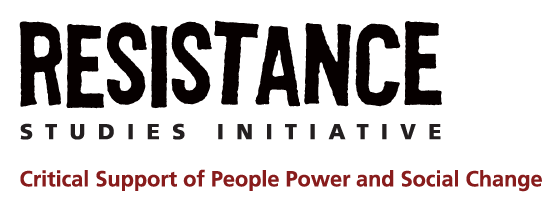
Resistance Studies Initiative Spring Webinar Speaker Series: Distinguished researchers and activists share critical reflections on resistance issues
Dr. Mahmoud Soliman is a Palestinian nonviolent activist and academic. He completed his PhD in Peace and Conflict Resolution Studies at Coventry University in April 2019, and the title of his thesis was “Mobilization and Demobilization of Palestinian Society Towards Nonviolent Resistance in the Period from 2004-2014.” He has gained extensive experience in the last 15 years in organizing nonviolent campaigns against the Segregation Wall and the Israeli settlements. He is one of the cofounders of a popular nonviolent resistance network called the Popular Struggle Coordination Committee (PSCC) in which he worked as the capacity-building coordinator supervising the production of training materials for activists in the occupied Palestinian Territories. He is an affiliate with the Sociology department faculty and the Resistance Studies Initiative (RSI) at the University of Massachusetts, Amherst.
This Webinar will explore the following themes:
• The challenges faced by the residents of the marginalized communities in the South Hebron Hills and the Jordan Valley.
• Tactics used by the residents of the communities against the Israeli policies
• Lifestyle of Palestinian marginalized communities as a form of resistance.
• Takeaway lessons from these communities to other marginalized communities.
Abstract: Israel has been forcibly displacing Palestinian communities through house demolitions and restricting residents’ movements to reach their land and to use their resources. Reports from human rights organizations and United Nations organizations showed the escalation of the process of eviction of Palestinians from communities located in Area C under full Israeli military control. Some communities have been entirely demolished more than one time in short periods such as Humsa community which has been demolished 5 times in 3 months. The residents refused to leave their communities and stayed resilient on their land, they rebuilt what the Israeli occupation authorities demolished. Drawing on detailed interviews with the residents, as well as the author’s observations and first-hand experience of more than 15 years as an activist involved in organizing campaigns, this article argued that the persistence and determination of these communities to stay in the communities and to challenge the occupation policies is as a result of the lifestyle of the residents of these communities. This article finds that the lifestyle of the residents is a form of resistance which fostered their sumud (resilience) and enabled them to mobilize people and to stay in their communities.
This study identified the tactics used by Palestinian grassroots activists to challenge the forcible eviction of their communities. It also identified the kind of lifestyle, Shepherds and farmers, that enabled the residents to overcome the Israeli policies from house demolishing to limit of the residents’ access to their land. The study also looked at the lifestyle of the residents that enabled them to gain different kinds of skills, experiences and know-how that fostered their sumud and mobilize people around them. The study presented an in-depth empirical study of two double marginalized areas, the South Hebron Hills and the Jordan Valley, located in Area C in the occupied Palestine territories under full Israeli occupation. It finds that the lifestyle of the residents of the communities were the key factor behind the existence of these communities despite the Israeli measures against them.
